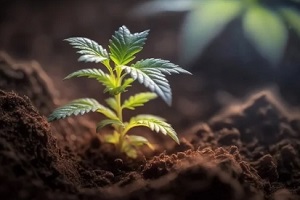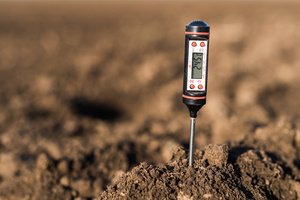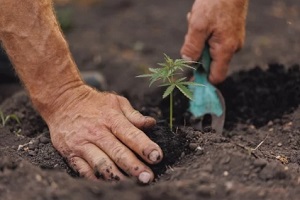 In today’s article, we’re going to review one of the most vital but often overlooked aspects of cannabis cultivation: soil pH. Yeah, it might sound like some science jargon, but trust us, this knowledge can take your growing game from good to epic.
In today’s article, we’re going to review one of the most vital but often overlooked aspects of cannabis cultivation: soil pH. Yeah, it might sound like some science jargon, but trust us, this knowledge can take your growing game from good to epic.
Ever wonder why some plants just seem to thrive better than others, even when they’re treated the same? Part of the answer lies beneath the surface, in that dark, earthy stuff we all love—the soil. The pH of your soil, to be exact, can significantly impact how well your cannabis plants grow.
Keep reading on to learn more about where your cannabis soil’s pH should be when it comes to growing the biggest, healthiest buds around.
Understanding pH
The term ‘pH’ may sound like something straight out of a high school chemistry class, but it has significant implications for your cannabis plants. Short for ‘potential Hydrogen,’ pH measures the acidity or alkalinity of a solution.
The pH scale ranges from 0-14, with 7 being neutral, anything below it is considered acidic, and anything above is alkaline. This scale is logarithmic, meaning each unit represents a tenfold difference.
The Importance of pH for Cannabis Plants
For cannabis plants, the pH isn’t a trivial matter—it’s a vital one. The ideal pH range for cannabis soil is between 6.0 and 7.0, while a slightly lower range of 5.5 to 6.5 is preferred for hydroponics or non-soil mediums. This specific range is important because it dictates how well your plants can take in nutrients, a process known as nutrient uptake.
Your nutrient uptake can be compromised if the pH drifts too far from this ideal range, which can lead to nutrient deficiencies or even toxicities. This can happen even if the nutrients are abundant in the cannabis soil or other solution.
Whether you’re securing your cannabis soil from a trusted source like Dirt Connections, or another dirt supplier, you’re going to want to ensure that you keep your chosen medium well within this range.
Soil pH and Nutrient Availability
The pH of your cannabis soil directly affects the availability of essential nutrients to your cannabis plants. When the soil is too acidic (low pH), your cannabis plants can be locked out from accessing calcium, magnesium, and phosphorus, which are all important nutrients for plant growth.
Conversely, if the soil becomes too alkaline (high pH), the availability of iron, manganese, zinc, copper, and boron, essential micronutrients for cannabis plants, becomes restricted.
Measuring and Adjusting Soil pH
 So, how do you go about measuring soil pH? There are a few ways to do it, but one of the simplest methods is to use a pH meter or test kit. These are readily available online or at local gardening stores.
So, how do you go about measuring soil pH? There are a few ways to do it, but one of the simplest methods is to use a pH meter or test kit. These are readily available online or at local gardening stores.
After testing your soil, you might discover that the pH isn’t in the ‘Goldilocks zone’—but there’s no need to worry; you can adjust it. If you need to raise the pH of overly acidic soil, gardeners typically use lime or calcium carbonate. Conversely, to lower the pH of overly alkaline soil, you can use substances like sulfur or phosphoric acid to help.
However, any changes to soil pH should be made slowly and incrementally to avoid stressing your plants. If you’re growing in soil, having a slightly acidic pH is generally safer. This is because most of the essential nutrients that cannabis plants need are more available within this range.
The Impact of Water pH
The pH of the water you’re going to use is another important factor to consider when growing cannabis plants—after all, the pH of your water can alter the pH of your growing medium over time, so it’s important to test it regularly. Like with soil, pH testing kits are also available for water.
If you find that your water’s pH is off, it can be adjusted in much the same way as your cannabis soil. To increase the pH of your water, you can use a product like pH Up; to decrease it, you can use a product like pH Down.
What to Do in Case of pH Problems
If you suspect that a pH problem is affecting your plants, the first step is to check the pH of your soil or water. If you identify a pH imbalance, try to correct it slowly and monitor the plants for improvement.
If your plants continue to show signs of nutrient deficiencies despite having a balanced pH, they may suffer from a nutrient lockout. In such cases, flushing the soil with pH-balanced water can help reset the growing medium and allow your plants to start absorbing nutrients again.
pH and Plant Symptoms
Understanding the common symptoms of pH imbalance can help you diagnose problems early and take corrective action. When the pH is too high, cannabis plants may exhibit symptoms like slow growth, yellowing leaves, or a burnt look on leaf tips. Plants can show signs of nutrient burn when the pH is too low, such as dark, curled, or glossy leaves.
Securing the Finest Cannabis Soil
 It’s clear that the health and productivity of your cannabis plants rest on multiple factors, but the pH of your soil plays a monumental role. Understanding and maintaining the right soil pH can significantly boost your cannabis plants’ growth, leading to bigger yields and healthier plants.
It’s clear that the health and productivity of your cannabis plants rest on multiple factors, but the pH of your soil plays a monumental role. Understanding and maintaining the right soil pH can significantly boost your cannabis plants’ growth, leading to bigger yields and healthier plants.
Yet, successful cultivation doesn’t end with a thorough understanding of pH; quality soil and the right supplements are equally vital. That’s where Dirt Connections come in: they offer top-notch soils, aggregates, and essential supplies to ensure your plants aren’t just surviving—but thriving.
So whether you’re new to cannabis cultivation or a seasoned grower, don’t forget to test your soil and monitor its pH. Remember, small changes can make a big difference in the life of your plants.
When it’s time to get the best quality soil or other cultivation needs, check out Dirt Connections; they’re ready to help you succeed in your cannabis cultivation journey. Reach out today to get started by visiting them online, or by calling 1-703-940-9949 in Virginia or 1-301-691-3215 in Maryland.
Summary

Dirt Connections was started with one goal in mind: providing quality residential and commercial construction services to clients on time and on budget. Reach out for more information on how we can support your next project.
For your convenience our estimates are free and by appointment. Call 703-940-9949 for a free estimate today!



